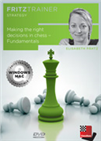The queen of chess makes her next move
Published on January 25, 2023 in The Spectator
Zoe Strimpel thus describes Judit Polgar in her article profiling the strongest-ever woman chess player in the world:
 In a total of 6 chapters, we look at the following aspects: the right decision based on tactical factors, decisions in exchanges and moves, complex and psychological decisions in longer games and in defence.
In a total of 6 chapters, we look at the following aspects: the right decision based on tactical factors, decisions in exchanges and moves, complex and psychological decisions in longer games and in defence.
Then there is Polgár herself, with red nails, a sharply-tailored purple jacket and fishnet stockings barely visible between kitten heel and trouser cuff as she walks round the room simultaneously playing twenty or so opponents, ranging in this case from kindergartners to the Georgian minister to Hanif Qureshi, the genial head of the Pakistani chess federation. Polgár is relaxed, smiling, the queen of all she surveys, and easily wins against everyone bar Qureshi, against whom she draws. The chess festival is a success: glamorous, I surmise, in a way particular to the former Soviet bloc where, as Polgár tells me later, “every household had a chess board… we had a huge chess tradition.”
On Polgar’s opinion about Netflix’s hit series ‘The Queen’s Gambit’:
I am half expecting Polgár to roll her eyes at the “Netflix effect,” but she was delighted with it. “That was something very special, people were connecting me to The Queen’s Gambit series, even though it was a fiction, but the final part, where she was successful and beat the very best players, it resembled a little bit my story, and that I like very much,” she says. “Also it was extremely well done from different angles: it was very authentic, the chess part was at least 95 percent [right] from my perspective. And,” she adds somewhat amusingly, given that the heroine is a drug-and-booze addicted orphan with an attraction to Cold War Russia, “I was extremely happy that it was not about a crazy person, a lunatic, that it was not connected to politics.”
On Polgar’s assessment of chess as a tool to be used beyond the board:
“Most of the things I do, I slice it up or I break it down,” she says. “How do I deal with the unexpected situations? How much am I ready to make decisions? How do I deal with problems? How do I deal with things when nothing works out? How do I take a loss? How do I take a success and continue after that?”
Read the full article...
In this DVD, Erwin l'Ami guides you through the fascinating Benko Gambit. As early as move three Black starts a fight for the initiative, a strategy that has proved to be successful in countless amateur and master level games.
Links























